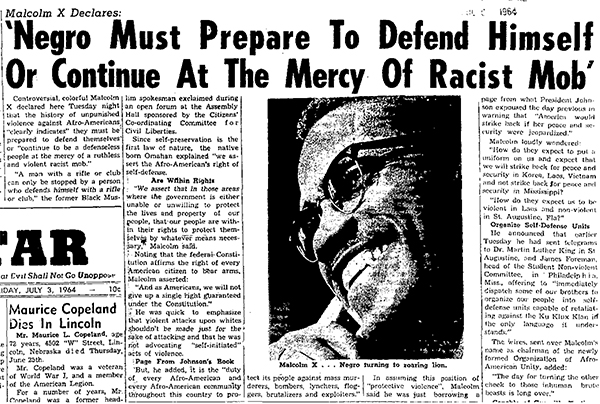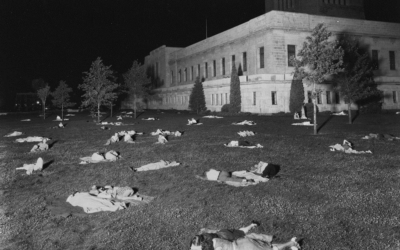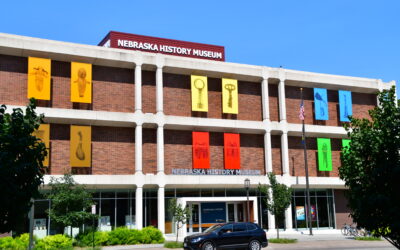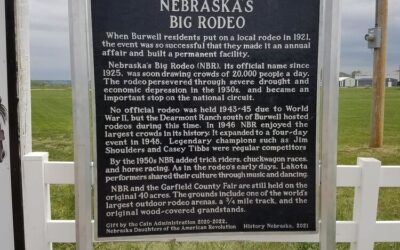
By David L. Bristow, Editor
The Omaha World-Herald reporter seemed surprised that Malcolm X smiled so much. The famous activist was not “the surly, white-baiting orator he was pictured to be in his Black Muslim days,” wrote Al Frisbee.
Invited by a local civil rights group, Malcolm X returned to his hometown on June 30, 1964, to deliver speeches at the Elks Club on Lake Street and at the lecture hall at the old Omaha Civic Auditorium. It was a time of transition for the outspoken leader. No longer affiliated with the Nation of Islam (whose members were known as the “Black Muslims”), Malcolm X was striking out on his own. He told the Elks Club audience that his new organization was called Afro-American Unity.
“I used to believe in Elijah Muhammad,” Malcolm said of the Nation of Islam’s leader. “I believed in him as a person and I believed in his philosophy that the white man is the embodiment of evil.”
Malcolm had become a Sunni Muslim earlier that year.* In April he made a pilgrimage to Mecca. In his autobiography, published after his death, he said that it affected him deeply to see Muslims of “all colors, from blue-eyed blonds to black-skinned Africans. But we were all participating in the same ritual, displaying a spirit of unity and brotherhood that my experiences in America had led me to believe never could exist between the white and the non-white.”
He was passionate about Islam. Later that day another reporter asked, “You grew up in a Christian atmosphere in a Christian city. Why did you change?” Malcolm replied, “My father, a Christian minister, was run out of this city by the Ku Klux Klan, who are also Christian. He was lynched in Michigan by Christians. I didn’t have to change—there was no Christianity for me to change from.”
Malcolm told the Elks Club audience that he was no longer pursuing Black Muslim goal of complete separation. He even welcomed the help of White people, but unlike Dr. Martin Luther King Jr. he wasn’t eager to work closely with White allies. “They don’t need to join us. They should join each other to change the attitudes of the white community toward the black community.”
“Our goal now is the complete recognition and acceptance of the Negro as a human being by any means necessary.”
By any means necessary. It was a phrase Malcolm was known to use.
“Does that mean violence?” the reporter asked.
“I do not advocate initiating violence, but only a few days ago President Johnson warned others that America would strike back if our interests were jeopardized. We feel the Negro should be prepared to defend his life and his property.”
Malcolm had more to say on that subject that night at the Civic Auditorium. Citing the history of unpunished violence against African Americans, he argued that people must either defend themselves or “continue to be a defenseless people at the mercy of a ruthless and violent racist mob,” the Omaha Star reported.
“A man with a rifle or club can only be stopped by a person who defends himself with a rifle or club,” he said, noting that the US Constitution affirms the right to bear arms. Again, he cited President Johnson’s recent statement that America would strike back against foreign enemies.
“How do they expect to put a uniform on us and expect that we will strike back for peace and security in Korea, Laos, Vietnam and not strike back for peace and security in Mississippi? How do they expect us to be violent in Laos and non-violent in St. Augustine, Florida?”
St. Augustine was in the news because of ongoing civil rights protests. Nonviolent protesters had been arrested at segregated lunch counters and restaurants. In the following months the Ku Klux Klan beat protesters, shot into Black homes, and made death threats. Police and the courts ignored the Klan and arrested nonviolent protesters instead. (“Today,” said Malcolm, “the Ku Klux Klan has taken off its sheets and donned a uniform—a police uniform.”) Dr. King was arrested on June 11 simply for trying to enter a restaurant. By then the situation had grown so violent that some local activists began practicing armed self-defense.
“I and the others have armed,” said St. Augustine civil rights leader Dr. Robert Hayling. “We will shoot first and answer questions later. We are not going to die like Medgar Evers.”
Malcolm X, in other words, was not alone in calling for armed resistance. His Omaha remarks illustrate the difference of opinion between Dr. King, who embraced Mahatma Gandhi’s philosophy of nonviolent resistance, and those who doubted that such an approach would ever succeed.
Despite their differences in tactics, Malcolm supported Dr. King’s work. He said his organization had telegraphed King and offered to send help to St. Augustine.
“The day for turning the other cheek to those inhuman brute beasts is long over,” Malcolm said, and added later, “If you do not think that the Afro-American, especially in the upcoming, young generation, is capable of adopting the guerilla tactics now being used by oppressed people everywhere else on this earth, you are making a drastic mistake.”
By then, Malcolm X was under FBI surveillance and also receiving death threats from his former Nation of Islam associates. On June 8 a caller told his wife, Betty Shabazz, that her husband was “as good as dead.” Malcolm was shot to death while giving a speech in New York on February 21, 1965. Three members of the Nation of Islam were convicted, two of whom were exonerated in 2021. Who may have ordered the murder remains a matter of controversy.
Shortly after Malcolm’s death, Dr. King telegrammed Betty Shabazz to express his condolences. Regarding their differences, King wrote:
“While we did not always see eye to eye on methods to solve the race problem, I always had a deep affection for Malcolm and felt that he had a great ability to put his finger on the existence and root of the problem. He was an eloquent spokesman for his point of view and no one can honestly doubt that Malcolm had a great concern for the problems that we face as a race.”
*At that time he also adopted a Muslim name, Malik el-Shabazz, and after his pilgrimage was entitled to use the honorific el-Hajj. I refer to him as Malcolm X throughout since that is how he was known to the public.
(Newspaper: Omaha Star, July 3, 1964)
Posted February 1, 2022
Sources:
Al Frisbee, “U.N. Is Goal of Malcolm X,” Omaha Evening World-Herald, June 30, 1964, 1-2.
Duane Snodgrass, “Malcolm X: Anything Whites Do, Blacks Can Do Better,” Omaha Evening World-Herald, July 1, 1964, 4.
“‘Negro Must Prepare to Defend HImself Or Continue at the Mercy of Racist Mob,'” Omaha Star, July 3, 1964.
Adam F.C. Fletcher, “A Biography of Malcolm X in Omaha,” North Omaha History, March 13, 2019. https://northomahahistory.com/2019/03/13/a-biography-of-malcolm-x-in-omaha/
“’Malcolm X: Make it Plain’: Timeline of Malcolm X’s Life,” American Experience, PBS, https://www.pbs.org/wgbh/americanexperience/features/malcolmx-timeline-malcolm-xs-life/
The Autobiography of Malcolm X, as told to Alex Haley (New York: Random House, 2015 [originally published 1965]), pp. 390-391.




